Adjusting astro-cycles
when the end is near...
By John Townley, June
2017
The
current count-down to the coming
vortex,
along with the chaotic
political changes that
are its symptoms, requires
a different way of looking at things, both personally and
astrologically. We
have previously pretty much summed up the skies governing the outside
situation,
including
the USA
and its players.
But we haven't yet suggested what to do about it. Although you can't
change the skies and what they bring in general, you can make decisions
on how you're going to handle it.
Fundamentally,
we are spiraling out of
control toward the
world power-shifting Jupiter-Saturn
conjunction
(a
20-year cycle), itself finally having shifted element from earth to air
(a
200-year cycle, ¼ of a total Jupiter-Saturn grand mutation
cycle
of 794 years).
It’s especially significant because it’s happening inside the bowl
of the outer planets, and
during a
period of weakening of the world’s biggest power center, the
USA,
due to
disenabling transits (Pluto and Neptune) and recently retrograde
progressed
Mars. In the largest sense,
the ship we’ve been sailing on is
past its sale
(sail?) date, headed for an as-yet-unsighted iceberg – after
which denouement
some of us will find the lifeboats to carry us to a new vessel while
many
others go down with the ship. Metaphorically speaking, we're all on
board of a global-scale version of the R.M.S. Titanic,
and there's an iceberg waiting ahead.
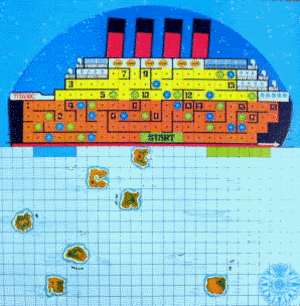
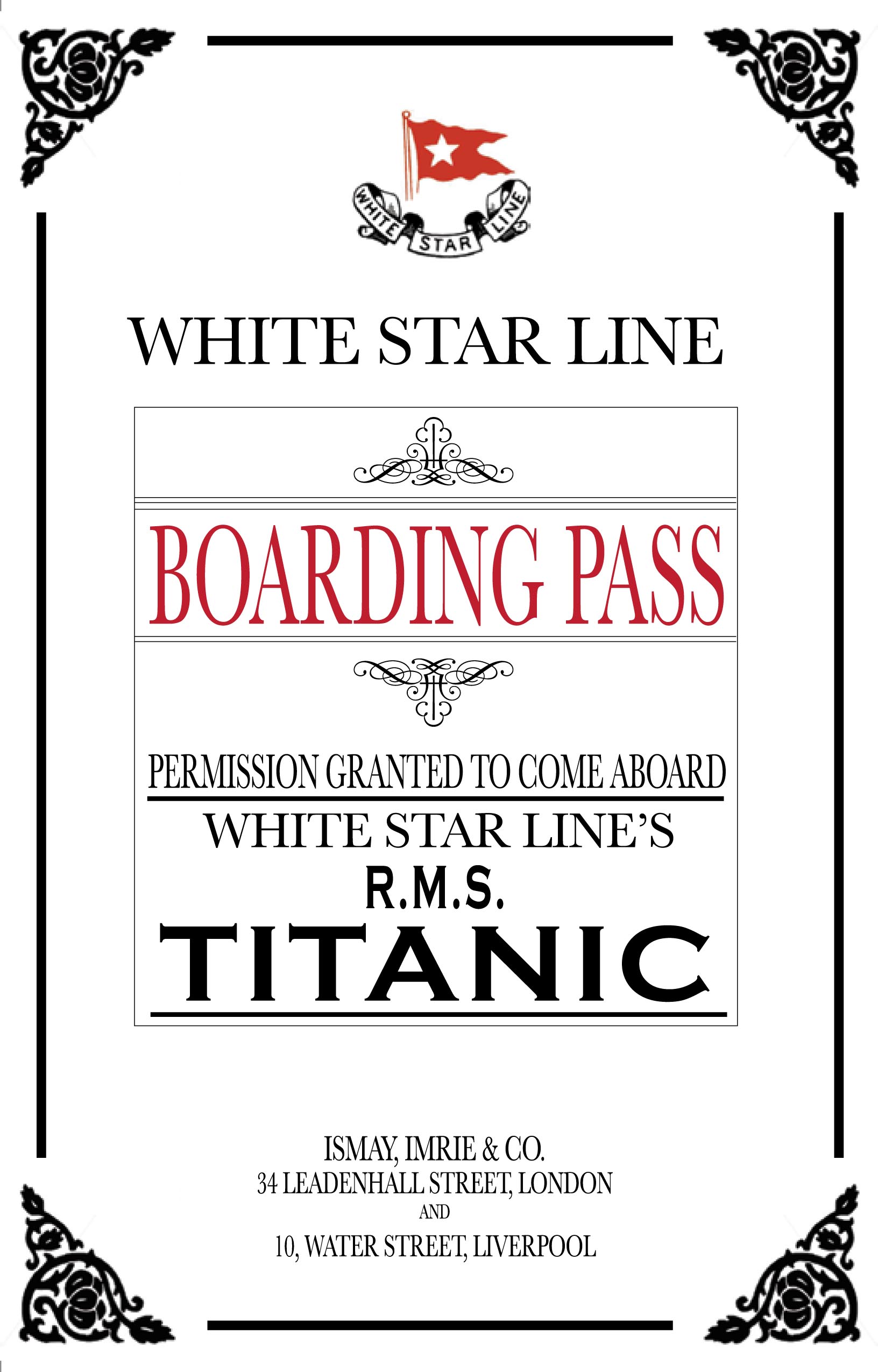
When you board, you expect a long voyage,
but it may not be that way. But you can play the game
from moment to moment.
Of
course, most of our fellow
passengers don’t know that,
though a select few suspect it (as was the case under similar skies in the late 1930s).
Either way, given the limited parameters of our present situation, how
do you
live life, whether you just think it will eventually end (for each of
us, as always)
or in fact that end may be particularly close ahead for many?
The
details of the parallel/metaphor of the RMS Titanic
beckon, so it’s worth a look to see how
it might be done. Like,
what do you do when you’re thrown together with rich and
poor, in
a shipboard
universe of vastly differing possibilities, with a clueless captain who
assumes
the ship can’t sink? As an astrologer, what planets do you
look
to for help or
explanation, what aspects do you turn to for support, when the likely
acting
time-frame is suddenly reduced from an open-ended
three-score-and-ten-plus lifetime
to only a couple of years?
The
ultimate practical answer depends
on your local real-time
situation on the ground, but lessons and examples can be gleaned from
other circumstances
that provide parallels and potential gameplans. On a large scale, you
might
observe cultures that had reason to sense war (or some radical change)
was
imminent, and how they behaved, the cultural footprint they left
behind. One
that comes to mind is pre-WWII
Germany and
France, where where as the Taurus Jupiter-Saturn conjunction loomed,
life got very intense, indeed. The sense of fateful
abandon
became very strong (think Cabaret,
or
Django Reinhardt’s Hot Five), and the ecstasy, gloom, or
hysteria
of the moment
tended to outweigh the more ordinary, future-oriented, work-and-save
style of
living. This manifested itself as live-for-the-moment struggle among
the less
well-off during the evolving Depression and as complete disregard for
the
future among the wealthy. The former knew things were bad and getting
stranger,
and the only outlet was to party like there was no tomorrow when the
chance
afforded, and the latter simply partied all the time, like tomorrow
would never
come. That split existed aboard the Titanic
(especially as highlighted in the 1997 film), in the styles and
attitudes of
the first-class passengers as opposed to the poorer classes below decks
who
nevertheless energetically made the best of it.
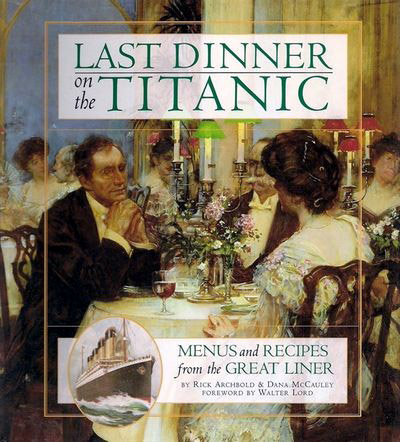
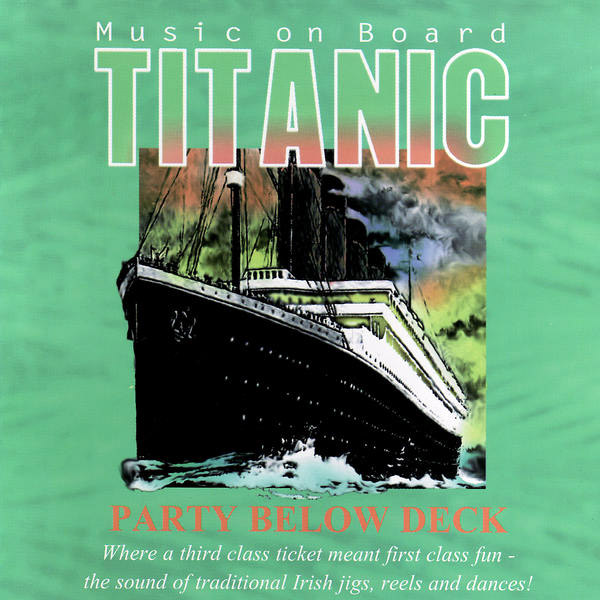
Every moment at the table is an experience to be relished, and enjoy the
music, every note rings of the present.
A
similar, but slightly different,
individual comparison
might be a sudden diagnosis of late-stage cancer, upon which a
long-term view of
sacrificing (or ignoring) the present for future gain suddenly
collapses into a
short-term blowout when every moment might be the last, and just a few
moments
down the road certainly will be. Although the first reactions (as
outlined in
Kubler-Ross’s On
Death and Dying) are
usually the hardest, often tales evolve that highlight not only final
acceptance but greater joy in the present, the small things in life,
and the
immediacy of existence in the personal microcosm that reflects the
macrocosm of
eternity.
And this sense of
the
preciousness of the moment and close surroundings often lingers well
after, in
those who actually outlive the predicted death sentence and go on to
live a renewed but altered existence. They are the ones who
didn’t go down with the
ship,
but made it
to the lifeboats, which changed their lives. A corollary of that would
be
battle survivors who have seen their comrades fall but lived to tell
the tale.
The intensity begins when the threat is imminent, and lingers after it
has
passed.
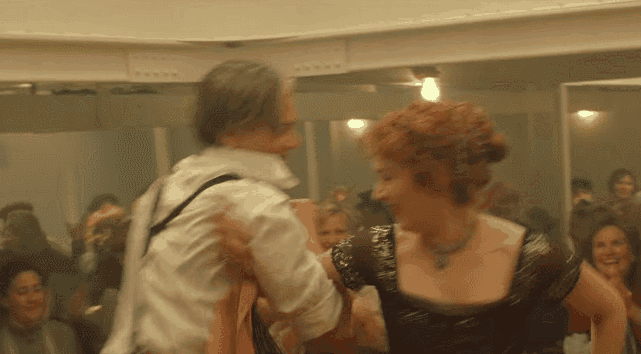
...and though you feel as if you're in a
play, you are, anyway -- so dance on as the planets rise and set in
time to the music.
Regardless
of how it comes upon you,
the essence of the
realization is that where and when you are is absolute, a set-piece, a
little
capsule of
existence that won’t repeat but is nevertheless eternal and
all-encompassing in
itself.
What
describes this, astrologically?
Putting focus on the
diurnal aspects, and after that lunar ones, rather than the longer
life-developing cycles of Mars, Jupiter, and Saturn that most
astrologers lean
on for analysis. When thinking of your own life or advising others, in
the light of
coming
changes over the next several years that are both certain in time but
utterly
unpredictable in manifestation, the emphasis would be on what planets
are
angular at what time of day (planets on
angles
graph keeps track) combined with when one’s natal
planet degrees are
angular four times a day. With at eighty-plus daily instants to look
forward
to and figure out how to utilize, that turns a single day into a cosmic
lifetime, which repeats again
the
next day, but slightly shifted, begging for further development.
For those on the Titanic,
where the lifetime framework was only five days from departure
to demise, not even a quarter of a lunar cycle, those were everything.
At this
level the emphasis shifts to mealtimes and what’s on your
plate
(one bite at a
time), times for music and dancing, drinking, opportunities to make
love,
moments on deck to take the fresh air, even relishing wave-rocked sleep
and its
lush dreamscapes. A ship (especially that
ship) is a world unto itself, an opportunity to explore all the nooks
and crannies it affords, on every level, on
every
deck, every hallway and passageway from stateroom, to ballroom, to
dining room,
to galley – whether entitled by a first-class ticket or a
snatched moment when
no one is looking. In that small, brief world of April 10-15, 1912,
there still
was a full plate on tap, all day and all night. Take a walkthrough, and see...
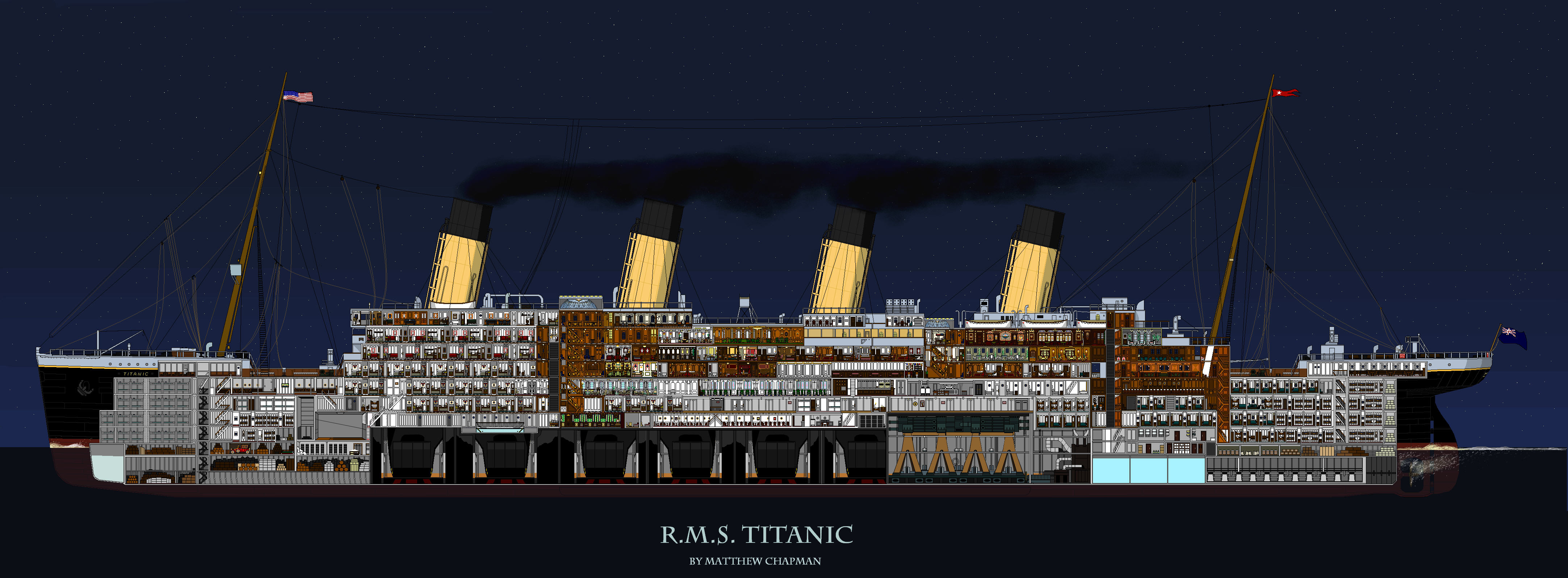
It's a big world, with lots of spaces to
explore (see larger
version for intriguing details), make each moment a new experience.
For
the rest of us with a more
comfortable several years
ahead before the expected general reset, there is considerably more
time to
chase down a personal bucket list, or to simply relish and cherish the
localities we happen to be passing through (or are stuck in). Watch for
and
relish those diurnal prospects daily, but also keep an eye on where the
full
and new Moons strike to emphasize the month’s developments.
And
while you’re at
it, check out your coming solar returns, as you might want to travel
to get some advantage over
where
you’d normally be, and perhaps have a life-changing
experience
during the trip.
If you get the chance, try out the same for monthly lunar returns. Or
just
relocate for a while to put a new angle on each day, as the principle
behind
relocation charts may be the diurnal
return itself.

